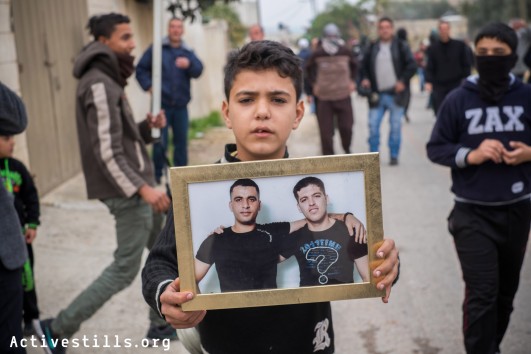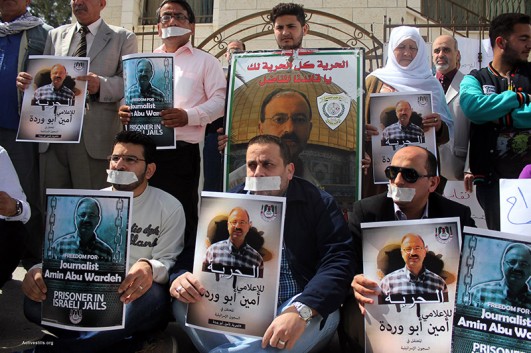Journalists, scientists, human rights activists and even a clown are among the Palestinians currently sitting in Israeli jails.
By Yael Marom

The vast majority of Israelis are not interested in Palestinian prisoner statistics. After all, for them, Palestinians are not human beings but “terrorists,” and as such it’s perhaps preferable that as many as possible sit behind bars. But for the thousands of Palestinian prisoners held in Israeli jails at any given moment, they are subject to a system of occupation and oppression that pursues, threatens and jails as a matter of daily routine. Journalists, scientists, human rights activists and even a clown are among the prisoners.
Since the occupation began in 1967, Israel’s military legal system has jailed anywhere between half a million and 800,000 Palestinians, according to estimates. This is an almost inconceivable number. The saying goes that there are practically no Palestinian homes without someone in jail. The conviction rate of Palestinians who have been arrested and tried in this system stands at around 99 percent. This means that if you are a Palestinian who has been arrested, it is worthwhile agreeing to a plea bargain, because you have almost no chance of being found innocent.
Millions of people living in the occupied territories lack human rights and are subjected to daily violence, monitoring and financial control, restrictions on movement and building, and more. Furthermore, every Palestinian knows that the threat of prison is permanently dangling over him, and that Israel can arrest and detain him without trial for an unlimited period, citing “confidential materials.” These wholesale arrests are a central part of the mechanism that allows for Israel’s continued hold over the occupied territories.

Israel arrested 6,440 Palestinians in 2016, among them 1,332 children, including girls, and 164 women, according to a recent report published by the Palestinian Prisoners Club, Palestinian prisoner rights group Addameer and the Al-Mezan Center for Human Rights. Palestinians in East Jerusalem, many of whom are Israeli residents, were particularly targeted: 2,029 were arrested in 2016, 37 percent of whom were minors.
The number of Palestinians in Israeli prisons at the end of 2016 numbered around 7,000, according to the report, of whom 42 were women. Some 300 of them are children, including 11 girls, the report states.
Among the arrestees are also those in administrative detention, an Israeli speciality: over the previous year, 1,742 orders for detention without trial were served against Palestinians. As of the end of 2016, Israel was holding around 700 Palestinian administrative detainees, according to the report — around 10 percent of the total number of Palestinian prisoners. What was supposed to be a tool used exceptionally in “ticking bomb” scenarios has become almost routine.
It’s important to note that there are people who have been sitting in jail under administrative detention for months, or even years, without knowing what they’re suspected of or being given the opportunity to defend themselves. They have been imprisoned after members of Israel’s security apparatus managed to persuade the court that they have evidence, that nonetheless remains confidential. And the courts are easily persuaded. Each time, someone can be sent to jail for up to six months under administrative detention — but there’s no limit to the number of times the detention order can be extended, without the need to go to trial.
Of the 22 Palestinian journalists currently in detention, nine are under administrative detention. They include Omar Nazzal, a member of the Palestinian Journalists’ Guild, who was arrested at the Allenby Crossing at the end of April last year. He had been on his way to a meeting of the European Federation of Journalists in Sarajevo. A few days after Nazzal’s arrest, the military prosecutor realized there wasn’t enough evidence to put him on trial, and he was instead sent to administrative detention on the basis of confidential information. In an interview with The Seventh Eye, Nazzal’s lawyer claimed that he had been arrested because of his journalism. He also voiced his suspicion that the Israelis and the Palestinians were coordinating his detention, due to his writing “causing a headache” for both sides.
Yael Marom is Just Vision’s public engagement manager in Israel and a co-editor of Local Call, where this article was originally published in Hebrew. Translated by Natasha Roth.

